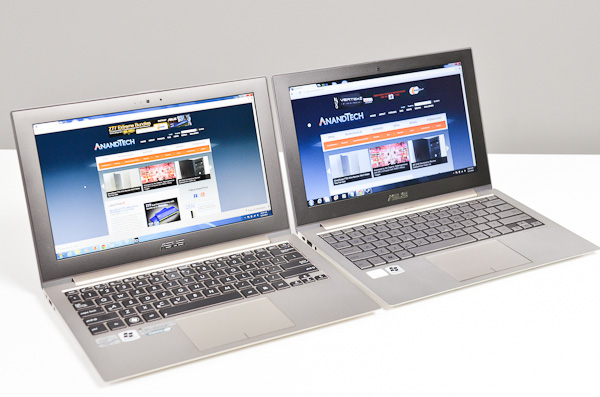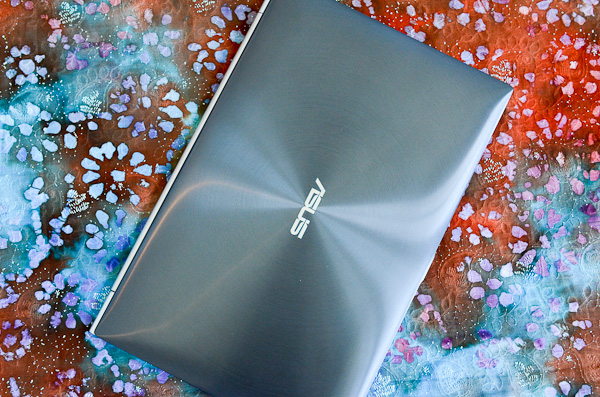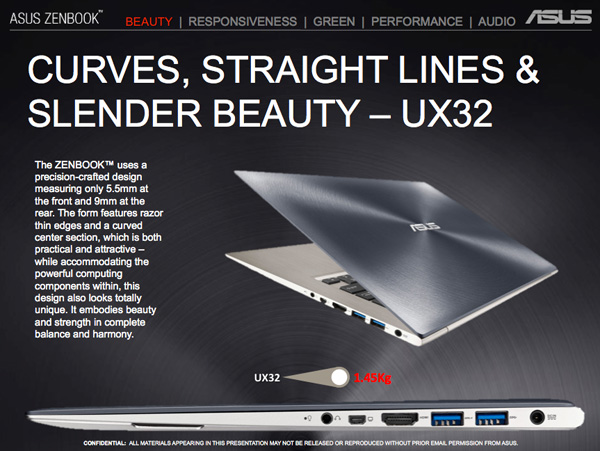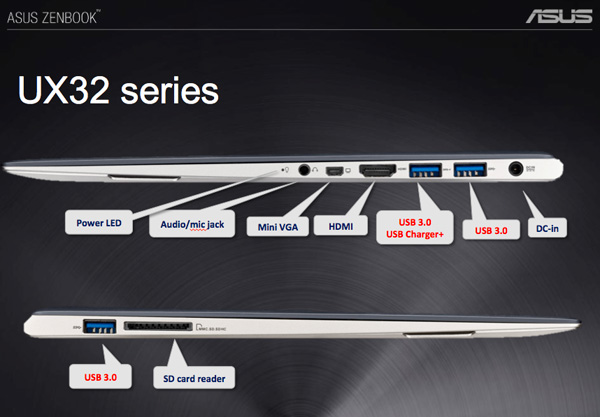ASUS Zenbook Prime (UX21A) Review: The First of the 2nd Gen Ultrabooks
by Anand Lal Shimpi on May 22, 2012 2:46 PM EST- Posted in
- Laptops
- CPUs
- Asus
- Ivy Bridge
- Zenbook
- Zenbook Prime
- Ultrabook
- Notebooks
The first round of Ultrabooks were mostly underwhelming. It shouldn't be a surprise, but many of the efforts were just half hearted at best. Of the companies who shipped the first Ultrabooks however, it was ASUS who came the closest to perfection with the Zenbook.
ASUS' Zenbook embodied the form factor, portability and overall concept of an Ultrabook. Where it failed to deliver was with its keyboard, display and, at least initially, with its trackpad. The first Zenbook was an amazing effort given the short period of time that it was conceived and developed in, but it was too rough around the edges.
Despite only being introduced 7 months ago, the Zenbook is old news. This is the Zenbook Prime:
The Zenbook Prime is ASUS' second generation Ultrabook, built around Ivy Bridge silicon. Unlike most silicon updates to notebooks however, the Zenbook Prime takes an almost Apple-like approach to renovating the tangibles rather than just relying on a faster chip to do the heavy lifting.
I don't know that I've ever seen a faster turn around on implementing reviewer and user feedback into a product. The Zenbook Prime fixes nearly every issue I had with the original Zenbook. From keyboard to display, it's all significantly better with the Zenbook Prime.
The circumstances around today's launch are a bit peculiar. Intel has an embargo in place on the as of yet unreleased Ivy Bridge CPUs, this applies to both notebooks and desktops. One such line of CPUs, the dual-core ultra-low-voltage Ivy Bridge parts that will find their way into many Ultrabooks, is covered by the aforementioned embargo. That embargo lifts at some point in the not too distant future, but ASUS wanted to have its review-ready hardware out the door and getting coverage before then. Why the urgency? It could have something to do with Apple's expected launch of updated MacBook Air and MacBook Pro systems. Rather than for Apple to get all the glory for being first, ASUS set some guidelines: we're allowed to talk about everything to do with the new Zenbook Primes, we just can't get into specifics on the CPU just yet. That's right, you won't read any model numbers, clock speeds or cache sizes here. Given what's already public about the ULV Ivy Bridge lineup I suspect this information isn't too hard to figure out if you're really motivated.

Zenbook Prime (left) vs. Zenbook (right)
The rest of the Zenbook Prime has nothing to do with Ivy Bridge. The form factor of the Zenbook Prime remains unchanged from its predecessor. Just like before we'll see two distinct models, an 11-inch (UX21) and 13-inch (UX31) in for review. With the lid closed, these two look identical to their Prime-less (composite numbered?) counterparts. ASUS sent the 11-inch Zenbook Prime in for review:
| ASUS Zenbook Prime Specs | |||||||||
| UX21A-DB5x | UX21A-DB7x | UX31A-DB51 | UX31A-DB52 | UX31A-DB71 | UX31A-DB72 | ||||
| CPU | ULV IVB | ULV IVB | ULV IVB | ULV IVB | ULV IVB | ULV IVB | |||
| GPU | HD 4000 | ||||||||
| Display | 11.6-inch 1920 x 1080 IPS | 13.3-inch 1920 x 1080 IPS | |||||||
| Memory | 4GB DDR3-1600 (on-board) | ||||||||
| Storage | 128GB U100 SSD | 128/256GB U100 SSD | 128GB U100 SSD | 256GB U100 SSD | |||||
| Wireless Connectivity | Intel Centrino N 6205, 802.11b/g/n 2.4/5GHz 2x2:2, Bluetooth 4.0 | ||||||||
| Battery | 35Wh | 50Wh | |||||||
| Camera | 720p front facing | ||||||||
| Audio | Bang and Olufsen ICEpower | ||||||||
| I/O | 2 x USB 3, 1x audio/mic, 1x microHDMI, 1x miniVGA | 2 x USB 3, 1 x audio/mic, 1 x microHDMI, 1 x miniVGA, 1 x SD Card reader | |||||||
| Dimensions | 299mm x 168.5mm x 3-9mm | 325mm x 223mm x 3-9mm | |||||||
| Weight | 1.1kg | 1.3kg | |||||||
| Price USD | TBD | TBD | $1099 | $1199 | $1499 | $1599 | |||
Pricing is still in the air as the Zenbook Prime won't be shipping until early June. I suspect much of how aggressive ASUS is on this front will depend on what Apple does in the coming weeks.
Introducing the UX32, Starting at $799
There's also a new member of the Zenbook Prime lineup, the 13-inch UX32. Featuring a thicker chassis, the UX32 will be offered as low as $799 with a 1366 x 768 TN panel, hard drive + SSD cache and as high as $1299 with a discrete NVIDIA GeForce GT 620M GPU:
| ASUS Zenbook Prime UX32 Specs | |||||||||
| UX32A-DB31 | UX32A-DB51 | UX32VD-DB71 | |||||||
| CPU | ULV IVB | ULV IVB | ULV IVB | ||||||
| GPU | HD 4000 | NVIDIA 620M + HD 4000 | |||||||
| Display | 13.3-inch 1366 x 768 TN | 13.3-inch 1920 x 1080 IPS | |||||||
| Memory | 2GB DDR3-1600 (on-board) + 2GB or 4GB SO-DIMM | ||||||||
| Storage | 7mm 320GB HDD + 24GB SSD (cache) | 7mm 500GB HDD + 24GB SSD (cache) | 7mm 500GB HDD + 24GB SSD (cache) | ||||||
| Wireless Connectivity | Intel Centrino N 6205, 802.11b/g/n 2.4/5GHz 2x2:2, Bluetooth 4.0 | ||||||||
| Battery | 48Wh | ||||||||
| Camera | 720p front facing | ||||||||
| Audio | Bang and Olufsen ICEpower | ||||||||
| I/O | 3 x USB 3, 1 x audio/mic, 1 x HDMI, 1 x miniVGA, 1 x SD card reader | ||||||||
| Dimensions | 325mm x 223mm x 5.5 - ~9mm | ||||||||
| Weight | 1.44kg | ||||||||
| Price USD | $799 | $999 | $1299 | ||||||
Depending on how well the SSD cache works, and how good the 1366 x 768 panel is, the $799 UX32A could be a very compelling system.













192 Comments
View All Comments
techexperience - Wednesday, May 23, 2012 - link
So, if what I see is correct, (and anand always delivers).The only difference between the Zenbook Prime UX32 $799 and $999 is hardisk space? From 320 GB to 500 GB for $200?By the way great post, Anand, as usual.
http://techexperience.net
ReverendDC - Wednesday, May 23, 2012 - link
I believe that the UX32 is also a little thicker, and the non-DV versions have a dedicated GPU. The hard drives are also platter, not SSD.ReverendDC - Wednesday, May 23, 2012 - link
Sorry, the DV version comes with the dedicated GPU.Reflex - Wednesday, May 23, 2012 - link
Likely a faster CPU as well.UrQuan3 - Wednesday, May 23, 2012 - link
Darn, I went with a Samsung 9 last year and can't afford to replace it yet. 13.3 is too big for me and 1366x768 is too low res. 12" and 1080p would be nice. Looks like an acceptable color gamut as well.Let's not make excuses for poorly written GUIs. They should resize. Games don't have a problem with that.
I do home Microsoft catches their resolution-vs-size mistake on Metro. Last I checked, Metro used fixed sizes and used higher resolutions to put more on the screen instead of allowing app links to resize. They were assuming that high resolution screens are also physically bigger. Of course that would be awful on a small, high res screen. Anyone know if they changed that?
Stanly.ok - Wednesday, May 23, 2012 - link
I look at official Asus slides (particularly at the top of second page) and can't help but wonder ... what kind of marketer or manager made them at the last moment instead of giving this job to a professional?!name99 - Wednesday, May 23, 2012 - link
" In practice I saw a doubling of performance under the same conditions as the original Zenbook (80Mbps vs. ~40Mbps)."This seems really bad. You should have got a doubling from 40MHz 5GHz channels, and a doubling from 2x MIMO. Are you sure the laptop and the base station are both set up optimally (most importantly both are in Greenfield mode so they're not wasting a huge amount of time with g compatibility)?
My 3 yr old MBA gets around 13MB/s to an 18 month old AEBS, and I've seen the new MBAs get around 20MB/s to that AEBS, and I expect even better to the newest AEBS.
IntelUser2000 - Friday, May 25, 2012 - link
I think its the way Anand tests it. On and Macbook Air 2011 review he gets 117Mbps which is 14.6MB/s.dczyz - Wednesday, May 23, 2012 - link
Since we dont have a new MX in the small form factor yet, that UX32VD-DB71 maybe what I do with. Cant wait to see a review on it.agent2099 - Wednesday, May 23, 2012 - link
The main fault I see in this device is the VGA port. They should have included a mini display port to complement the HDMI port. That way you could run two high-resolution displays from the laptop. With my current laptop I have the HDMI out going to the television and I have the mini display port going to my 24 inch monitor.